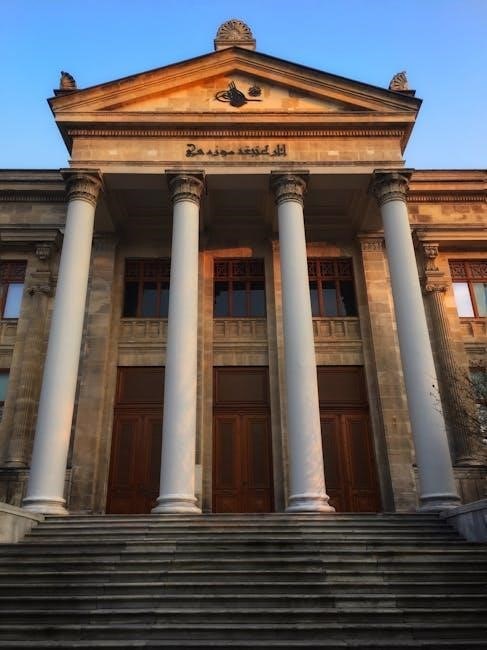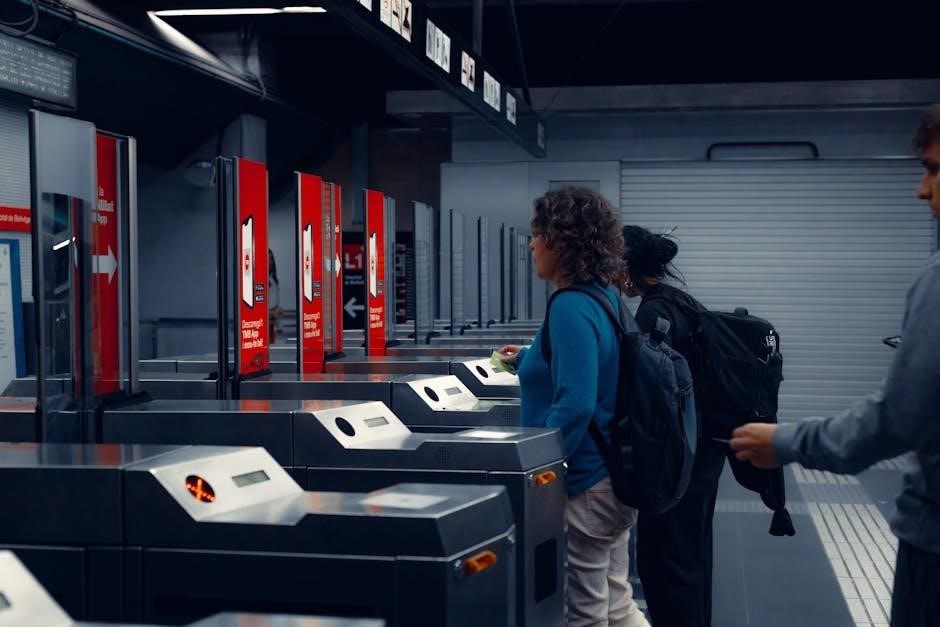The PA Access Card Museum List PDF provides a comprehensive guide to participating cultural attractions, offering discounted admissions for eligible Pennsylvania residents, enhancing accessibility to art, history, and science.
Overview of the PA Access Card Program
The PA Access Card Program is an initiative designed to make cultural experiences more accessible and affordable for Pennsylvania residents. It is part of the broader Museums for All program, which aims to encourage families and individuals from all backgrounds to engage with museums and cultural institutions. The program allows eligible residents to visit participating museums, science centers, and historic sites at a significantly reduced rate, typically $2 per person. This initiative is particularly beneficial for low-income families, individuals with disabilities, and those receiving government benefits, such as SNAP or EBT cardholders. The program not only promotes cultural accessibility but also fosters lifelong learning and appreciation for the arts and sciences. By partnering with over 80 attractions across Pennsylvania, the PA Access Card ensures that everyone can enjoy the state’s rich cultural offerings.
Importance of the Museum List PDF
The Museum List PDF is a vital resource for individuals utilizing the PA Access Card, providing a detailed directory of participating cultural attractions across Pennsylvania. This document simplifies the process of discovering which museums, science centers, and historic sites offer discounted admissions through the program. By listing over 80 attractions, including prominent institutions like the Philadelphia Museum of Art and the Carnegie Museums of Pittsburgh, the PDF enables users to plan their visits efficiently. It also highlights the specific discounts available, such as $2 admission for cardholders, and includes contact information for each location. This resource is especially valuable for families and individuals seeking affordable access to cultural experiences. The Museum List PDF ensures that users can maximize their benefits and explore Pennsylvania’s rich cultural landscape with ease. It serves as a cornerstone for promoting accessibility and inclusivity in the state’s cultural sector.

What is the PA Access Card?
The PA Access Card is a program for Pennsylvania residents with disabilities or those receiving government benefits, offering discounted admissions to museums and cultural attractions statewide.
Definition and Purpose of the PA Access Card
The PA Access Card is a program designed to enhance cultural accessibility for Pennsylvania residents with disabilities or those receiving government benefits. It provides discounted admission to participating museums, cultural attractions, and events across the state. The card aims to make educational and recreational experiences more affordable and inclusive for all. By presenting the card, eligible individuals can enjoy reduced entry fees at over 80 attractions, including world-class museums like the Philadelphia Museum of Art and the Carnegie Museums of Pittsburgh. This initiative promotes equality in access to cultural enrichment, fostering lifelong learning and enjoyment for diverse audiences.
- Eligibility includes Pennsylvania residents with disabilities or those receiving government benefits.
- The card offers discounted or free admission to participating cultural institutions.
- It supports accessibility and affordability for cultural experiences statewide.
Eligibility Criteria for the PA Access Card
Eligibility for the PA Access Card is based on specific criteria aimed at ensuring accessibility for individuals with disabilities or those receiving government benefits. Pennsylvania residents with disabilities or those monitoring government-issued cash, food, or medical benefits through an EBT card qualify for the program. Applicants must provide documentation, such as proof of disability, residency, and income eligibility, to demonstrate their eligibility. The program is designed to support individuals who may face financial or accessibility barriers, ensuring they can participate in cultural experiences. Once approved, cardholders gain access to discounted admissions at participating museums and cultural institutions across Pennsylvania. This initiative promotes inclusivity and affordability for diverse audiences, fostering cultural engagement statewide;
- Must be a Pennsylvania resident.
- Individuals with disabilities or those receiving government benefits qualify.
- Required documentation includes proof of disability, residency, and income eligibility.

How the PA Access Card Works
The PA Access Card provides discounted admission to participating museums and cultural institutions by presenting the card upon entry, offering affordable access to art, history, and science experiences.
Step-by-Step Process to Use the PA Access Card
Using the PA Access Card is a simple process designed to make cultural experiences accessible. First, review the list of participating museums and cultural institutions in the PA Access Card Museum List PDF. Next, contact the chosen venue to confirm their specific admission policies and any requirements for discounted entry. Some locations may require reservations or promo codes for online purchases. On the day of your visit, present your PA Access Card along with a valid photo ID at the ticket counter. This ensures you receive the discounted admission rate, typically $2 per person. Additionally, check if special events or exhibitions have varying pricing or availability. By following these steps, cardholders can enjoy affordable access to a wide range of cultural attractions across Pennsylvania.
Discounts and Benefits Offered by the Card
The PA Access Card provides significant discounts and benefits, making cultural experiences more affordable for eligible residents. Cardholders can enjoy reduced admission fees, typically $2 per person, at over 80 participating attractions across Pennsylvania. These include world-class museums, historic sites, botanical gardens, theaters, and zoos. The card also offers access to special events and exhibitions at discounted rates, though pricing may vary. Additionally, the program extends beyond Pennsylvania, granting cardholders access to over 800 museums nationwide through initiatives like Museums for All. This ensures that individuals and families can explore a wide range of cultural and educational opportunities at a fraction of the cost. The PA Access Card is a valuable resource for those seeking to engage with Pennsylvania’s rich cultural landscape while saving money.
Participating Museums and Cultural Institutions
The PA Access Card Museum List PDF highlights a diverse range of participating museums and cultural institutions across Pennsylvania. These include renowned attractions like the Philadelphia Museum of Art, The Franklin Institute, and the Carnegie Museums of Pittsburgh. Additionally, institutions such as the Heinz History Center and Longwood Gardens offer discounted access to cardholders. Beyond museums, the program extends to theaters, zoos, botanical gardens, and historic sites, ensuring a wide variety of cultural experiences. The list also features organizations like Opera Philadelphia and the Wilma Theater, providing opportunities for both visual and performing arts. This extensive network of participating venues makes it easier for residents to explore Pennsylvania’s rich cultural heritage at an affordable cost, fostering accessibility and engagement for all.

Benefits of the PA Access Card
The PA Access Card offers significant cost savings, enabling discounted admissions to museums, cultural attractions, and events. It promotes cultural accessibility, making art, history, and science affordable for all Pennsylvania residents, with many venues offering $2 admission.
Cost Savings for Museum Visits

The PA Access Card provides significant cost savings for museum visits, offering discounted admission to over 80 cultural attractions across Pennsylvania. Cardholders can enjoy reduced entry fees, often as low as $2 per person, making it an affordable way to explore world-class museums, science centers, and historical sites; This program ensures that individuals and families can access cultural experiences without financial strain. By partnering with institutions like the Philadelphia Museum of Art, The Franklin Institute, and Carnegie Museums of Pittsburgh, the PA Access Card bridges the gap between affordability and cultural enrichment. This initiative not only supports financial accessibility but also fosters a deeper connection to Pennsylvania’s rich cultural heritage, encouraging frequent visits and lifelong learning opportunities for all residents.
Encouraging Cultural Accessibility
The PA Access Card is a vital tool for promoting cultural accessibility across Pennsylvania. By offering discounted admissions, it ensures that individuals from all backgrounds can engage with the state’s rich cultural offerings. This program is particularly beneficial for families, individuals with disabilities, and those facing financial constraints, breaking down barriers to participation. The card’s acceptance at over 80 attractions, including museums, theaters, and botanical gardens, highlights its commitment to inclusivity. It not only fosters a sense of community but also enriches lives by providing access to educational and artistic experiences. The PA Access Card exemplifies Pennsylvania’s dedication to making culture accessible to all, ensuring that no one is excluded from the opportunity to explore and learn. This initiative plays a crucial role in creating a more inclusive and culturally vibrant society.
Participating Museums in Pennsylvania
The PA Access Card offers discounted admission to over 80 attractions across Pennsylvania, including renowned museums. Here are some key participating museums:
- Philadelphia Museum of Art
- The Franklin Institute
- Carnegie Museums of Pittsburgh
- Heinz History Center
Philadelphia Museum of Art
The Philadelphia Museum of Art, one of the largest and most renowned museums in the country, is a proud participant in the PA Access Card program. Located on the iconic “Rocky Steps,” the museum showcases a vast collection of over 800,000 works of art, spanning 2,000 years of human creativity. From European masterpieces to contemporary installations, visitors can explore diverse artistic traditions. With the PA Access Card, eligible individuals can enjoy discounted admission, making world-class art more accessible. The museum also hosts rotating exhibitions and educational programs, offering something for every interest. Its grand architecture and scenic location add to the visitor experience, making it a must-visit destination in Philadelphia.

The Franklin Institute
The Franklin Institute, located in Philadelphia, is a premier science museum and a key participant in the PA Access Card program. Renowned for its interactive and educational exhibits, the institute offers hands-on experiences that cater to visitors of all ages. From exploring the human body in the iconic Giant Heart exhibit to discovering the wonders of electricity and space, the museum provides an engaging environment for learning. With the PA Access Card, eligible individuals can enjoy reduced admission, making science and technology accessible to everyone. The Franklin Institute also hosts temporary exhibitions and special events, ensuring a dynamic and ever-changing experience. Its commitment to education and accessibility aligns perfectly with the goals of the PA Access Card program, fostering a love for science in diverse audiences.
Carnegie Museums of Pittsburgh
The Carnegie Museums of Pittsburgh are a collection of four renowned institutions dedicated to art, science, and history. They include the Andy Warhol Museum, Carnegie Science Center, Carnegie Museum of Art, and Carnegie Museum of Natural History. These museums offer a diverse range of exhibits, from contemporary art to scientific discoveries, providing something for every interest. With the PA Access Card, visitors can enjoy discounted admission, making these world-class attractions more accessible. The Carnegie Museums are committed to fostering learning and creativity, with interactive exhibits and family-friendly activities. Located in Pittsburgh, they are a cornerstone of Pennsylvania’s cultural landscape, offering a rich and engaging experience for all. The PA Access Card ensures that these opportunities are available to a broader audience, promoting cultural accessibility and education.
Heinz History Center
The Senator John Heinz History Center, located in Pittsburgh, is the largest history museum in Pennsylvania, showcasing the state’s rich heritage. It is part of the Carnegie Museums of Pittsburgh and offers a wide range of exhibits focusing on Western Pennsylvania’s history, including sports, industry, and cultural milestones. The museum is known for its interactive displays and family-friendly activities, making it a popular destination for visitors of all ages. With the PA Access Card, eligible individuals can enjoy discounted admission, typically $2 per person, allowing greater accessibility to this cultural treasure. The Heinz History Center is a must-visit for anyone interested in exploring Pennsylvania’s storied past and its impact on the nation. Its engaging exhibits and educational programs make it a cornerstone of cultural and historical education in the region.

How to Apply for the PA Access Card
Eligible Pennsylvania residents can apply online, providing proof of residency and disability or EBT card status. The process is straightforward, ensuring quick access to cultural benefits statewide.
Application Process for Pennsylvania Residents
Applying for the PA Access Card is a streamlined process designed to ensure accessibility for all eligible residents. Pennsylvania residents can submit their applications online or via mail, depending on their preference. The application requires proof of residency, such as a utility bill or driver’s license, and documentation confirming eligibility, which may include disability verification or evidence of participation in government assistance programs like SNAP or TANF. Once the application is submitted, it is reviewed by the relevant authorities to verify the provided information. Upon approval, the PA Access Card is mailed to the applicant, enabling them to access discounted admissions at participating museums and cultural institutions across the state. The process is designed to be user-friendly, ensuring that individuals can easily obtain the card and begin enjoying its benefits without unnecessary delays or complications.
Required Documentation for Eligibility
To qualify for the PA Access Card, applicants must provide specific documentation to verify their eligibility. Pennsylvania residents are required to submit proof of residency, such as a utility bill, lease agreement, or driver’s license. Additionally, applicants must demonstrate eligibility through participation in government assistance programs, such as SNAP or TANF, by providing their EBT card or a recent award letter. For individuals with disabilities, documentation from a healthcare provider or a disability verification form is necessary. All documents must be current and valid to ensure proper processing of the application. This streamlined process ensures that eligible individuals can access the benefits of the PA Access Card efficiently. Further documentation may be requested in certain cases to confirm eligibility criteria.

Tips for Visiting Museums with the PA Access Card
Plan your visit in advance, check for special events, and bring your PA Access Card and photo ID for seamless entry. Enjoy discounted admissions and explore Pennsylvania’s cultural gems.
Planning Your Museum Visit
Planning your museum visit with the PA Access Card ensures a smooth and enjoyable experience. Start by reviewing the museum list PDF to identify participating venues and their offerings. Check the attraction’s website for operating hours, ticket availability, and any specific entry requirements. Contact the museum directly to confirm ACCESS Card acceptance and reservation policies. Some venues allow online purchases with promo codes, while others may require in-person redemption. Consider visiting during off-peak times to avoid crowds and make the most of your time. Additionally, inquire about special events or exhibitions, as some may offer extended hours or unique experiences. By planning ahead, you can maximize your visit’s value and enjoy discounted access to Pennsylvania’s rich cultural and educational resources.

Special Events and Exhibitions
The PA Access Card enhances your cultural experience by offering discounted access to special events and exhibitions at participating museums. Many venues, such as The Franklin Institute and Carnegie Museums, host interactive exhibits, lectures, and workshops that cardholders can enjoy at a reduced rate. Seasonal events, such as holiday-themed activities or traveling exhibitions, often provide unique opportunities for engagement. Be sure to check the museum list PDF for details on upcoming events and participating locations. Some museums may require advance reservations or have specific entry procedures for special exhibitions. Contacting the venue directly can help clarify any requirements. By leveraging the PA Access Card, you can explore a wide range of cultural experiences, from science demonstrations to art workshops, making your visits both educational and entertaining.
Maximizing Your Museum Experience
To maximize your museum experience with the PA Access Card, plan ahead by reviewing the museum list PDF to identify participating venues and their offerings. Check each museum’s event calendar for special exhibitions, workshops, or interactive programs. Many locations, such as The Franklin Institute and Carnegie Museums, offer hands-on activities that enhance learning and engagement. Consider visiting during off-peak hours to avoid crowds and make the most of your time. Additionally, contact the museum in advance to confirm ACCESS Card benefits, as some special events may require reservations or have specific entry procedures. By leveraging the card’s discounts and planning strategically, you can enjoy a richer, more immersive cultural experience across Pennsylvania’s diverse attractions.

The PA Access Card Museum List PDF successfully bridges cultural accessibility, empowering Pennsylvania residents to explore diverse attractions affordably, fostering lifelong learning and enrichment across the state.
Final Thoughts on the PA Access Card Program
The PA Access Card Program is a transformative initiative that democratizes access to cultural and educational experiences across Pennsylvania. By offering discounted admissions to over 80 attractions, including world-class museums like the Philadelphia Museum of Art and the Carnegie Museums of Pittsburgh, the program ensures that individuals from all walks of life can engage with art, history, and science. This initiative not only promotes cultural accessibility but also fosters a sense of community and lifelong learning. The program’s collaboration with organizations like Museums for All further amplifies its impact, making it a model for other states to follow. With its user-friendly approach and widespread participation, the PA Access Card is a testament to the power of inclusive cultural policies.
Future of Cultural Accessibility in Pennsylvania
The future of cultural accessibility in Pennsylvania looks promising, with the PA Access Card Program paving the way for even greater inclusivity. As more museums and cultural institutions join the program, residents can expect expanded opportunities to explore art, history, and science at affordable rates. The integration of technology, such as mobile-friendly ticketing systems, will further streamline the process, making it easier for cardholders to plan visits. Additionally, partnerships with organizations like Museums for All will continue to enhance the program’s reach, ensuring that families and individuals from all backgrounds can participate. With a focus on sustainability and innovation, the PA Access Card Program is set to remain a cornerstone of Pennsylvania’s commitment to cultural accessibility, inspiring other states to adopt similar models and fostering a more inclusive cultural landscape for years to come.
